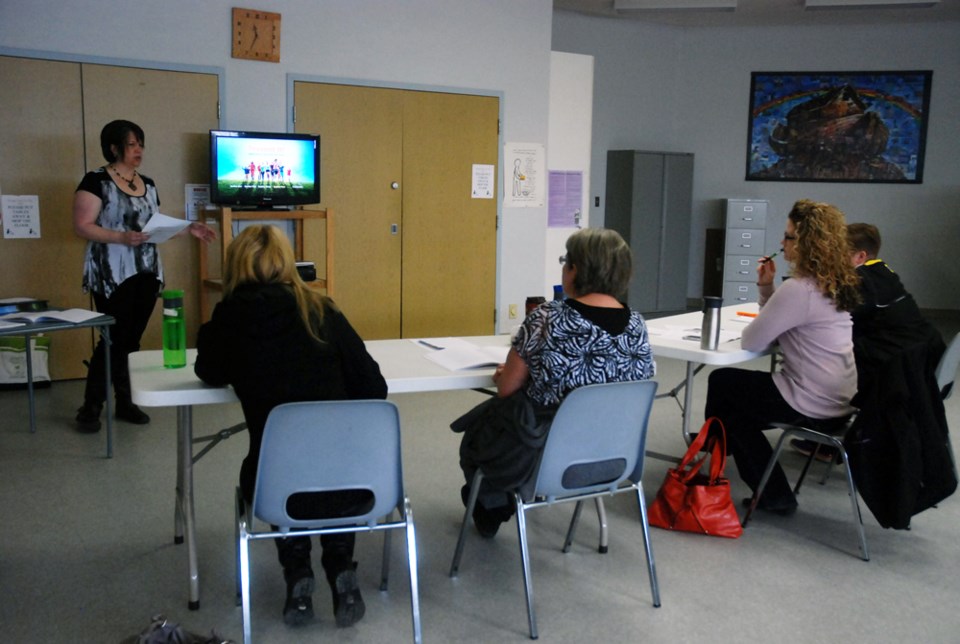As the most defenseless members of society, the responsibility for protecting children falls to the adults around them. It was for this reason that the first ever Little Warriors Prevent It! workshop was held in Humboldt on March 28 at the Westminster United Church.
It was facilitated by Little Warriors representative, Vicki Lund, and attended by four people. Over the course of three hours, Lund taught participants the essence of STOP: Study, Talk, Observe, and Prepare for action.
“I had hoped to teach people about child sexual abuse and give them the tools to deal with a situation if a child ever disclosed to them and the tools to look out for it,” said Lund. “They were quite shocked at the numbers and statistics. (By the end of the session), they were ready to go home and talk with their own kids because they didn’t know the full implications of child sexual abuse before.”
The statistics Lund is referring to is the fact that one in three girls and one in six boys under the age of 12 will be sexually abused. Participants were appalled to learn that it’s usually committed by someone the child knows.
The major thing that Lund wanted to stress was that in Canada there is such a thing known as the duty to report. Most people don’t know this, but everyone is legally required to report any allegations or suspicions of abuse of any child.
“You can be charged if child abuse is happening and it’s discovered you knew. It’s not your job to decide whether the abuse is real or not; that’s the job of Child and Family Services (CFS),” said Lund. “So my advice to any adult is if you suspect it and it seems likely, go ahead and make that call.”
The Study part of the STOP acronym focuses on learning what child sexual abuse is and differentiating it from what’s natural and healthy. The second, Talk, teaches individuals the right ways to go about having a healthy conversation with children about sexuality. The third, Observe, explains the red flags to watch out for in both children and adults. The final part is Prepare for action and that lays out what adults should and shouldn’t do if they suspect child abuse.
According to Lund, one of the first steps should always be to call CFS and then the police. Lund advises against speaking with the parents because either or both of them could be the perpetrators of the abuse.
“First and foremost, always tell the child that you believe him or her,” said Lund. “It’s important that they understand that someone believes them and there’s an adult that will listen.”
Since many children feel ashamed, embarrassed or have been convinced to keep it a “secret,” there are some key signs Lund says adults can watch out for:
If you know a child well and they have a sudden change in attitude or behaviour
For younger children, wetting the bed can be a sign of anxiety
If they suddenly refuse to go see a specific adult they had previous enjoyed spending time with, it would be a good idea to question them why
Cybertip also includes other signs of concerning behaviour that include:
Advanced sexual knowledge beyond his/her level of development
Sexualized behaviour inconsistent with other children of the same age
Clingy behaviour
A decline in school performance
Aggressive behaviour
Self-destructive (i.e., the child is physically harming him/herself and showing feelings indicating a lack of self worth)
Disrupted sleeping patterns
Since there are different levels of sexual abuse, it might be difficult for an adult to spot the signs, especially since they can also be indicative of other forms of abuse (suspicions of any type of child abuse still have to be reported). Sexual abuse of a child can encompass anything from inappropriate exposure to genital contact to penetrative abuse.
While most people can guess at some of the consequences of this harmful behaviour, not everyone is aware of the full extent. Children who have been sexually abused might suffer negative effects such as destructive feelings of guilt, shame, low self-esteem, and depression. It can also manifest physically with health issues, eating disorders, self-harm, drug and alcohol abuse, and suicide. In far-reaching scenarios, victims might fall prey to sexual promiscuity, prostitution, crime and violence, relationship and intimacy issues, and/or financial difficulties.
“You can’t really predict what people are going to do, but having this training will hopefully shed some light in dark corners,” said Lund. “It’ll also make it easier for parents to talk about it with their kids.”
For any adults seeking more information, they can go to the Little Warriors website: littlewarriors.ca. Another workshop will be facilitated in Humboldt again on May 9.




